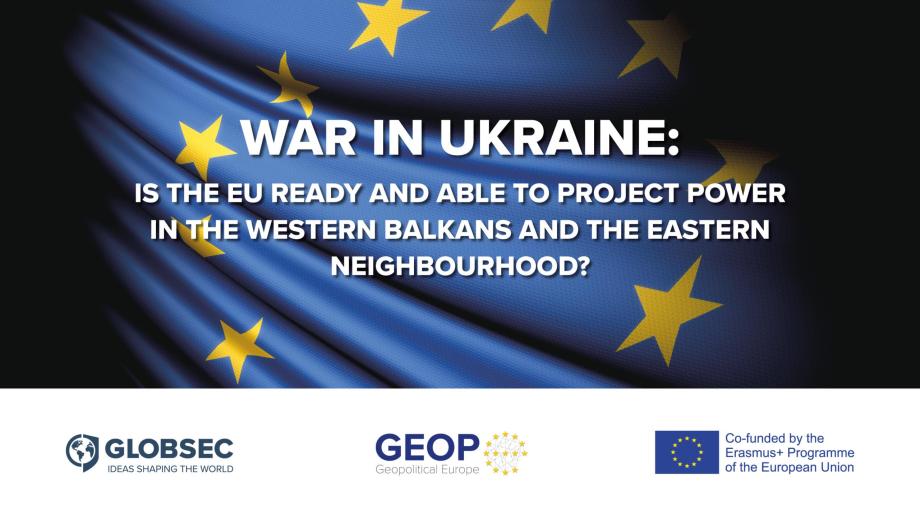War in Ukraine: Is the EU Ready and Able to Project Power in the Western Balkans and the Eastern Neighbourhood?

Policy Brief
The European Union (EU) finds itself in a ‘before’ and ‘after’ dynamic with respect to its neighbourhood strategy. Russia’s invasion of Ukraine marks a pivotal moment that could shift EU policy towards its immediate neighbourhood. The Union’s long-standing strategy, particularly in the Eastern Partnership countries (EaP) and Western Balkans (WB), has been aimed at enhancing stability, resilience, and prosperity.
The bloc has projected influence through its financial clout including the promise of large-scale investment packages and closer economic ties and the promotion of resilient democracies, human rights, and respect for the rule of law. The EU membership trajectory for WB countries is not at all straightforward though. And the Eastern neighbourhood, for its part, faces even greater obstacles. Indeed while the EU has expressed its political commitment to WB accession (though these processes may prove thorny and lengthy), this commitment is lacking for Georgia, Moldova, and Ukraine (the Trio countries) despite their recently submitted accession applications.
The current backdrop - conflict at the EU’s doorsteps - raises pertinent questions:
- Has EU influence in its immediate neighbourhood been powerful enough?
- What type of power can and should the EU project in the Western Balkans and the Eastern Neighbourhood in this evolving environment?
The ‘Before’ EU neighbourhood strategy
The EU prides itself on its ability to use soft power tools such as economic enticements and the magnifying appeal of European values to influence countries in its neighbourhood. The liberal democratic model has generally been perceived as a prudent tool for enhancing security, prosperity, and resilience in the immediate neighbourhood.
The EU’s ‘After’ must-do neighbourhood policies
Russia’s military aggression, persistent economic gaps, and democratic backsliding (apparent in the Western Balkans and the Eastern neighbourhood) all put to question the prevailing (or ‘before’ EU strategy) for the two regions. The EU ultimately proved to be naïve as now made readily apparent by Russia’s geopolitical and strategic moves and invasion of Ukraine. The Union, however, can seize this pivotal moment in history to transform itself into a true geopolitical actor. Unprecedented unity can be leveraged to spearhead concrete policy actions and institutional changes that will advance security and sustainable development regionally and globally in accordance with EU values.
Selected Recommendations
For EU leadership and Member States
- Build a common European foreign and security policy with three dimensions of power — economic, common values, and enhanced defence, with clear strategic coherence and with promoting EU interests effectively.
- Devise a clear EU path and strategy for EaP countries that aspire to be part of the EU family, while continuing to support countries that are not yet ready for accession status by signalling the promise the EU represents.
- Use this pivotal moment to support comprehensive reforms by providing tangible rewards and/or milestones to reforming countries in the two regions and to foster accountability aimed at ensuring that local institutions are working towards certain standards (and not merely developing façades).
- Enhance strategic communication through outreach to governments, businesses, and citizens and actively combat disinformation and distortion of the EU’s image in the WB and EaP.
- Plan for post-war Ukraine and EaP region reconstruction and recovery and build on best practices on reconciliation in the WB as well.
For WB and EaP national governments
- Pursue politically prudent course by introducing difficult reforms now to spur speedier convergence/alignment. Then, create a mechanism for monitoring and implementing reforms to ensure that the rule of law and democratic processes are adequately institutionalized.
- Communicate to citizens that the lengthy and arduous accession process can contribute to the development of vibrant, secure, and prosperous democracies.
- Identify how your countries, too, can contribute to the Union (while recognizing that EU membership or close alignment brings clear benefits in the reverse direction).
*The report is published within GLOBSEC GEOPE—Geopolitical Europe: Are the Member States Ready for It? Project supported by Jean Monnet Actions of the EU’s Erasmus+ program.
*The European Commission support for the production of this publication does not constitute an endorsement of the contents which reflects the views only of the authors, and the Commission cannot be held responsible for any use which may be made of the information contained therein.


